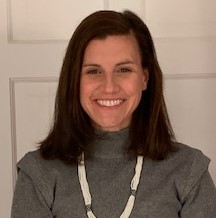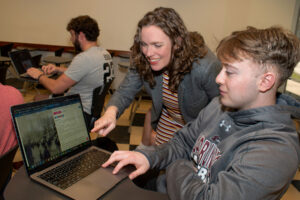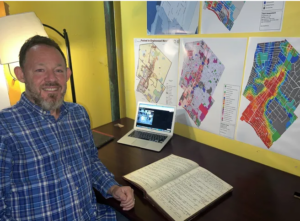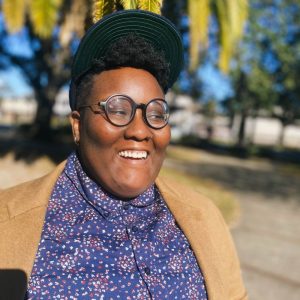- About Ramapo
- Academics
- Admissions & Aid
- Student Life
- Athletics
- Alumni
- Arts & Community
- Quick Links
- Apply
- Visit
- Give
School of Humanities and Global Studies (HGS)
March 14, 2024Professor Taranto's Students Participate in Sharing Stories Database
 In the fall semester of 2023, Professor Stacie Taranto’s HIST 316-01 course, “A History of Women in American Politics,” took part in a large, NEH-funded digital history project — the Sharing Stories from 1977 database — that will result in all 15 students in the class becoming published authors on the site. Sharing Stories is a growing digital history project run out of the University of Houston that is advised by prominent scholars in U.S. women’s history and relates directly to the course’s theme of women in American politics. The site captures the history of the National Women’s Conference. In November 1977, America held a taxpayer-funded National Women’s Conference (NWC) in Houston, Texas – the country’s first (and so far, only) taxpayer-funded national conference on women. The idea for the national conference sprang from a United Nations’ initiative in 1975. The idea was for each UN member nation, including the United States, to host a national conference to assess the state of women’s rights in that country — and to put together an agenda (with policy recommendations) for lawmakers that would make women equal to men in that country (socially, politically, legally, etc.) Before America’s national conference, there were a series of meetings held in each American territory and state – including New Jersey – to select 2,200 delegates (including 39 delegates and 1 alternate from NJ) to attend the national conference in Houston, and to begin coming up with policy ideas for American lawmakers (on every level) that would make women more equal to men.
In the fall semester of 2023, Professor Stacie Taranto’s HIST 316-01 course, “A History of Women in American Politics,” took part in a large, NEH-funded digital history project — the Sharing Stories from 1977 database — that will result in all 15 students in the class becoming published authors on the site. Sharing Stories is a growing digital history project run out of the University of Houston that is advised by prominent scholars in U.S. women’s history and relates directly to the course’s theme of women in American politics. The site captures the history of the National Women’s Conference. In November 1977, America held a taxpayer-funded National Women’s Conference (NWC) in Houston, Texas – the country’s first (and so far, only) taxpayer-funded national conference on women. The idea for the national conference sprang from a United Nations’ initiative in 1975. The idea was for each UN member nation, including the United States, to host a national conference to assess the state of women’s rights in that country — and to put together an agenda (with policy recommendations) for lawmakers that would make women equal to men in that country (socially, politically, legally, etc.) Before America’s national conference, there were a series of meetings held in each American territory and state – including New Jersey – to select 2,200 delegates (including 39 delegates and 1 alternate from NJ) to attend the national conference in Houston, and to begin coming up with policy ideas for American lawmakers (on every level) that would make women more equal to men.
Before the 50th anniversary of the National Women’s Conference in 2027, Sharing Stories is hoping to write biographies of all 2,200 delegates who attended the conference in 1977. Here are some sample biographies from other states. Before last semester, no biographies had been written about the 39 NJ delegates and 1 alternate. Professor Taranto’s 15 students each took a delegate to research, working alongside students from other colleges/universities in New Jersey (Monmouth University, Rowan University, Union County Community College, and The College of New Jersey). Thanks to their efforts, biographies have now been written of the 39 NJ delegates and 1 alternate delegate who attended the NWC in 1977.
The students in HIST 316 were given direction each week on what public sites to research their delegates on, and every week, the class wrote up summaries of what they learned (for Professor Taranto ‘s feedback) as well as talked about the process at the beginning of class, so they could learn from each other — as historians do at conferences. They were also in touch (if they wanted) with the other students in NJ working on delegates from NJ (as some of their delegates had been friends, so a Ramapo student might in the process of researching their delegate, stumble upon information about a delegate someone from TCNJ was researching). The students engaged in deep historical research, working with librarians at Ramapo College and the Mahwah Public Library, as well as their professor, to access sites such as Newspapers.com (professor’s subscription), Access World New (Potter Library), Proquest Newspapers (Potter Library), Heritage Quest (Mahwah Library), and much more. Through this process, some students got in touch with their delegates (or their family members) to learn about their political journeys in the 1970s. One student’s delegate even ended up joining the class via WebEx for the final class meeting to talk about her life, which drove home several political themes, especially about the growth of modern feminism, that the course covered. Students reported that this project really brought history to life for them — the goal of every history course!
In the end, each HIST 316 student wrote 500-word biographies of their delegates (going through multiple drafts with feedback from their professor and classmates) that are currently being fact-checked and edited at Sharing Stories for publication on the site in late summer /early fall 2024. One student in the class, Miranda Trautmann, will participate in a national forum (over Zoom) on March 25, 2024, with students from across the country who also researched delegates for Sharing Stories in their history classes, including students from the following institutions: Brown University (RI), Colby College (ME), DePauw University (IN), Idaho State University, Illinois State University, Merrimack College (MA), Rowan University (NJ), Sacred Heart Preparatory High School (CA), Saint Mary’s College (IN), Union College of Union County, NJ, University of Alabama at Birmingham, and the University of Houston (TX).
As a result of this fantastic experience, students in HIST 316 will not only become published authors, but they engaged in deep research of a historical subject, made connections with other history students across the nation and state, and learned about historical writing and editing.
Professor Taranto recently joined the national editorial board of Sharing Stories, where she will supervise 2 graduate students working on PhD’s in American history, as they edit and and fact-check delegate biographies produced by undergraduates (like her own in HIST 316) from across the country — prepping the biographies for publication on the site. Professor Taranto will draw on her experience as an associate editor at another major digital history project — Made by History at Time Magazine — to supervise this editorial process.
Categories: Faculty News, Grants and Awards, Student News
February 2, 2024Building Community and Preserving History Through Digital Humanities

Sarah Koenig
The National Endowment for the Humanities awarded Dr. Sarah Koenig, assistant professor of history, approximately $150,000 to develop digital humanities communities of practice (CoP) at Ramapo College. The grant is the largest awarded in New Jersey this cycle and will support training not only for faculty and students, but for members of partner communities including local public schools and the Ramapough Munsee Lenape Nation.
“This grant builds on existing digital humanities initiatives at Ramapo College and will provide ongoing support to develop these separate initiatives into a comprehensive and enduring digital humanities program at Ramapo College,” said Koenig. Since 2019, Koenig has developed three DH projects: Mapping the Ramapough Munsee Lenape Nation, Mapping the Wild West in New Jersey, and Making Modern New Jersey. She has assisted with two others: The Human Side of a Pandemic and the Penny Colman Collection of Historical Landmarks of Women.
Additionally, the grant supports training programs that enable our faculty and students to collaborate with community partners. These initiatives help to safeguard and share the rich histories of various communities. Ramapo faculty and students are currently immersed in compelling digital humanities projects focused on preserving and showcasing the histories of groups such as the Ramapough Munsee Lenape Nation and Englewood’s Fourth Ward. These communities possess invaluable narratives covering the founding of the American nation, the evolution of civil rights, environmental racism, and more. Leveraging digital humanities platforms empowers these communities to safeguard and present their histories authentically.
Koenig is proud about this grant and what it means for Ramapo College and the community. “This grant shows that Ramapo’s strengths—a liberal arts education, a collaborative spirit among faculty, robust opportunities for student research and community involvement—are being recognized by outside institutions.” She went on to explain how the National Endowment for the Humanities process is not just about having a good idea; it is also about showing that your institution can support that idea, adding, “I think the NEH reviewers saw the compatibility between this grant proposal and the values and strengths of the college more broadly.”

What are the Digital Humanities?
Digital humanities is an exciting hybrid field that combines the methods of the humanities: critical inquiry, close reading, qualitative research, creative writing, etc., with digital tools such as mapping, blogging, podcasting, and digital exhibits, in order to expand understanding of the humanities, create public-facing humanities projects, and critically engage with technology. Ramapo College creates opportunities to with community members to learn about the digital humanities such as the Passaic County Community College-Ramapo College Experiential Learning and Digital Humanities Conference held on January 26.
Using Digital Humanities Technology
Faculty in the School of Humanities & Global Studies utilize digital humanities technology and diverse humanistic research approaches to produce scholarship accessible to the public. They collaborate with community groups to create applied humanities projects aimed at preserving community knowledge, encouraging public inquiry, and nurturing literacies in digital, informational, historical, and cultural domains. Through research projects and digital course assignments, faculty provide Ramapo students with hands-on learning experiences, allowing them to develop a profound understanding of their subject matter and acquire valuable, marketable skills.
The Importance of the Digital Humanities
Integrating digital tools into a humanities education equips students with a comprehensive skill set, positioning them effectively in a dynamically evolving job market. “The humanities are not only compatible with but essential to emerging technologies, because the critical thinking, deep analysis, and attention to culture that the humanities provide help us to use digital technologies in more equitable, thoughtful, and creative ways,” shared Koenig.

David Colman
Hands-On Learning Opportunities for Students
One of the most exciting parts of this grant is that Ramapo students will be involved at multiple levels. Students will work as student-faculty researchers on specific digital humanities projects, such as Englewood Makes History, the Penny Colman Collection, and Mapping the Ramapough Munsee Lenape Nation. Students not only within the School of Humanities & Global Studies, but across the college will learn digital humanities methods and participate in digital humanities projects as the technology is integrated into more courses in the Ramapo curriculum.
Categories: Faculty News, Faculty-Student Research, Grants and Awards
March 7, 2023Indya Jackson Wins Teaching Fellowship
Dr. Indya Jackson, assistant professor of African-American liter ature, has been awarded a teaching fellowship by Digital Ethnic Futures Consortium (DEFCon) to develop two digital humanities projects at Ramapo College.
ature, has been awarded a teaching fellowship by Digital Ethnic Futures Consortium (DEFCon) to develop two digital humanities projects at Ramapo College.
One project is for the English and literary studies senior seminar in the School of Humanities and Global Studies. The question guiding the seminar is, “How do marginalized communities use satire as a form of resistance?” Students will engage with texts such as Paul Beatty’s The Sellout, Charles Yu’s Interior Chinatown, Mosin Hamid’s The Last White Man, and Chinelo Okparanta’s Harry Sylvester Bird. Jackson aims “to incorporate into the course the social annotation of assigned criticism” and anticipates that “students will meaningfully and critically engage with challenging academic texts in an interactive way.”
The second project focuses on the creation of an online exhibit showcasing audio and visual materials related to assigned readings. Exhibited materials will likely include audio recordings of authors reading from their work, video interviews with scholars, and/or original audio and visual art that relates to the course themes. Jackson expects that the exhibit “will provide a unique, yet critical means through which students can explore and connect with the course material.”
Categories: Faculty News, Grants and Awards
Copyright ©2025 Ramapo College Of New Jersey. Statements And Policies. Contact Webmaster.

Follow Ramapo